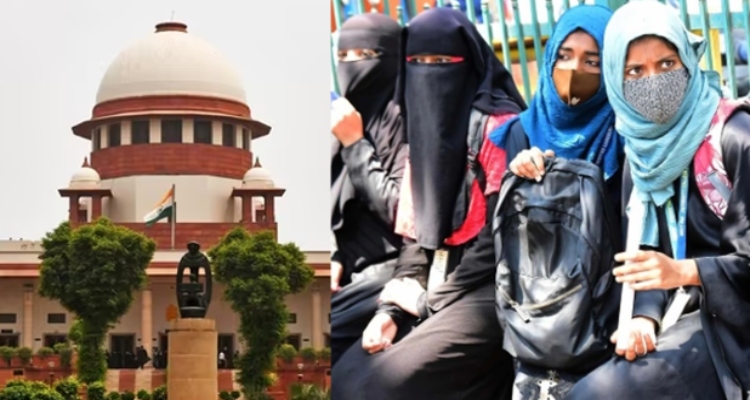
The Supreme Court on Friday (August 9) criticized a Mumbai college for its ban on students wearing burqa, hijab, or niqab on campus and partly stayed the notice issued by the institution in this regard.
A bench of Justices Sanjiv Khanna and PV Sanjay Kumar issued notice on the petition challenging the ban while staying the prohibition on hijabs and caps.
“We issue notice in the week commencing November 18. We partly stay clause 2 of the impugned circular to the extent that it directs that no hijab, no cap, no badges will be allowed. We hope and trust this interim order is not misused by anybody,” the Court stated in its order.
During the hearing, the Court questioned the rationale behind the decision and emphasized that students should be allowed to wear what they choose.
The Court remarked that the college’s decision undermines the empowerment of women. “How are you empowering women by dictating what they should wear? Less said the better. Where is the choice for the woman? You have suddenly woken up to the fact that they are wearing it. It is unfortunate that these issues are being addressed after so many years of independence while religion is a significant part of this country,” Justice Kumar said.
Regarding the college’s stance that it aims to prevent the revelation of students’ religion, Justice Khanna responded, “Religion is evident in names as well. Do not impose such rules.”
The Bench was hearing a plea challenging the Bombay High Court verdict that upheld the ban imposed by a Chembur (Mumbai) college on students wearing burqa, hijab, or naqab on campus. The petition was drafted by advocate Hamza Lakdawala and filed through advocate Abiha Zaidi.
Senior Advocate Colin Gonsalves, representing the petitioner, argued that students had been barred from attending classes and were not receiving attendance. “They wore the hijab for four years,” Gonsalves said.
In response, Senior Advocate Madhavi Divan, representing the college, stated that there are 441 female Muslim students at the college, with only three wishing to wear the hijab. She justified the ban by claiming that wearing a naqab creates a barrier.
However, the Court was not convinced by this submission and questioned the sudden implementation of the decision. “You may be correct. The background they come from… family members may insist on wearing it, but let all study together,” the Court remarked.
Justice Kumar also criticized such rule-making by colleges and questioned whether the college would also prohibit students with tilak or bindi. “That is not part of the instruction at all. You have not mentioned that,” the Bench told the counsel representing the college.
Divan opposed the stay and argued that girls might start wearing torn jeans and that the naqab created a barrier to interaction. “Do not take away my (college’s) autonomy,” she submitted.
At this point, Justice Khanna said, “You cannot handle it this way. The solution to many of these issues is proper, good education. I understand that a burqa cannot be accommodated in a classroom setting.”
The issue arose after nine students from NG Acharya and DK Marathe College in Chembur challenged a notice from the college mandating a new dress code starting from the new academic year in June. The High Court dismissed the plea, stating that the directive aimed to prevent the disclosure of students’ religion, allowing them to focus solely on their education.
Aggrieved, the students approached the Supreme Court. They argued that the college, affiliated with Mumbai University and aided by the State of Maharashtra, lacked the authority under any law to impose such restrictions. They contended that the restriction violates Article 15 of the Constitution by creating a hostile environment for female students, particularly those of the Muslim faith. They further argued that wearing a hijab, naqab, or burqa does not disrupt classroom learning or discipline, nor does it accord any unfair advantages.




